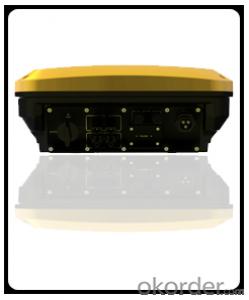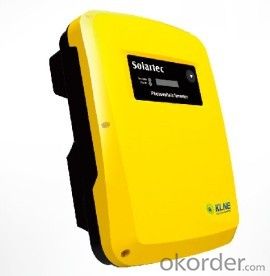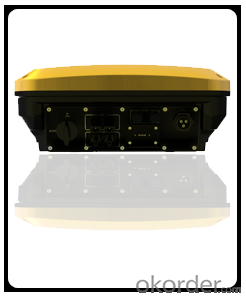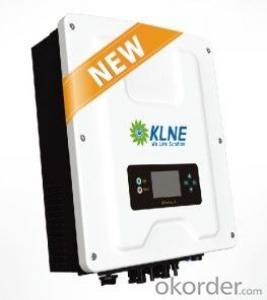Lithium Solar Inverter Solartec 2000 On Grid Inverter with WiFi
- Loading Port:
- Shanghai
- Payment Terms:
- TT OR LC
- Min Order Qty:
- -
- Supply Capability:
- 10000 set/month
OKorder Service Pledge
Quality Product, Order Online Tracking, Timely Delivery
OKorder Financial Service
Credit Rating, Credit Services, Credit Purchasing
You Might Also Like
Solartec 1500,2000,2500,3000,3600,4000,4600,5000
1MPPT, single phase
IP 65
New mold with Pure thick aluminum crust.
Efficient
■ Efficiency of up to 97.6 %
■ TransformerlessSafe
■ Integrated DC switch
■ Comprehensive protection functionsFlexible
■ LCD backlight
■ For indoor and outdoor installationSimple
■ ‘Plug and play’connection for easy installation
■ Friendly interface, easy to install and maintain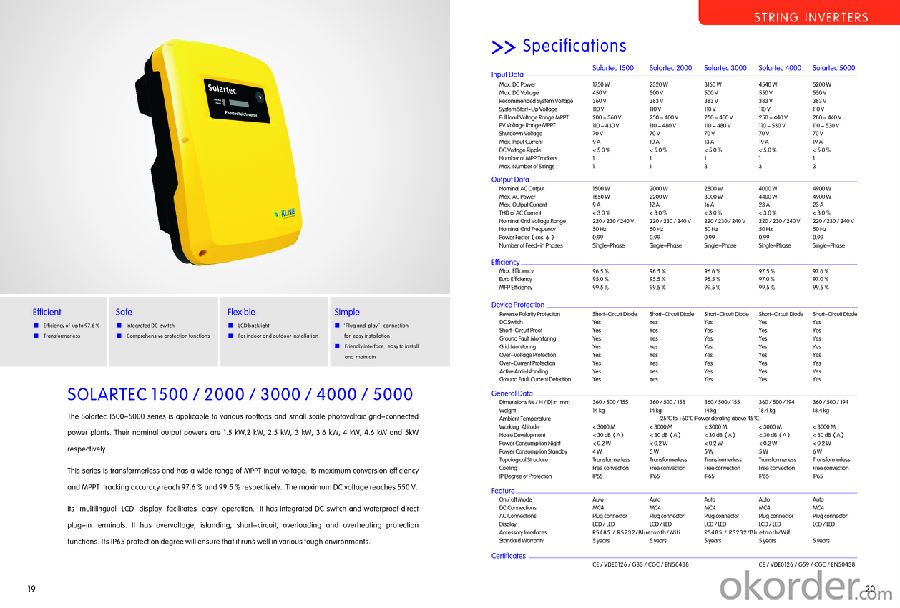
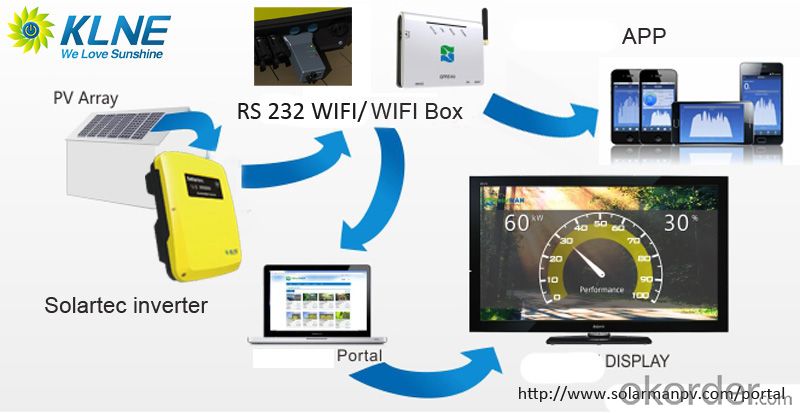
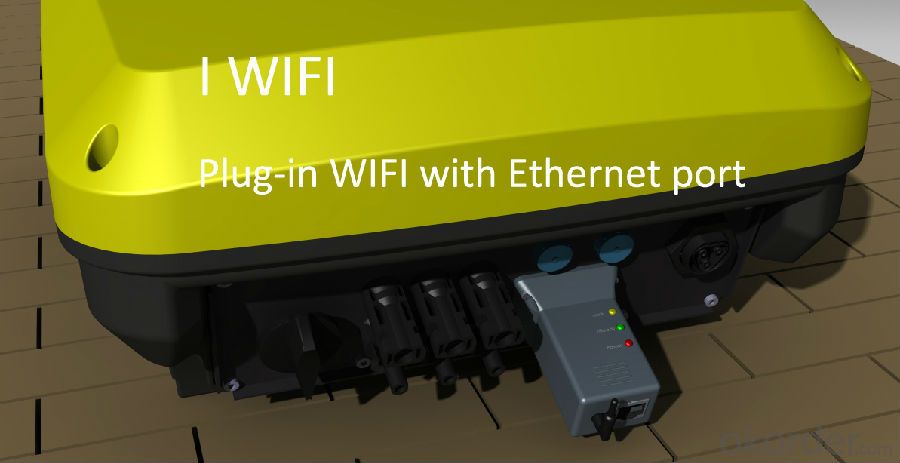
- Q: What is the role of a grid-tie inverter in a solar PV system?
- The main purpose of a grid-tie inverter in a solar PV system is to convert the DC electricity produced by the solar panels into AC electricity that can be utilized to supply power to electrical devices in homes or businesses. In a solar PV system, the solar panels generate DC electricity when exposed to sunlight. However, most residential and commercial establishments require AC electricity, which is the standard form of electricity provided by utility companies. This is where the grid-tie inverter comes into play. The grid-tie inverter takes the DC electricity generated by the solar panels and transforms it into AC electricity that is compatible with the electrical grid. It ensures that the electricity produced by the solar panels is synchronized with the utility power and can be seamlessly integrated into the existing electrical system. One of the primary functions of a grid-tie inverter is to match the frequency, voltage, and phase of the AC electricity generated by the solar panels with that of the utility power. This synchronization is crucial to guarantee a smooth flow of electricity between the solar system and the grid, and to prevent any interruptions or harm to the electrical system. Furthermore, a grid-tie inverter also serves as a safety monitor for the electrical grid. It continuously checks for any voltage or frequency fluctuations in the grid and can automatically disconnect from the grid in case of a power outage or grid failure. This feature is important to ensure the safety of electrical workers who might be repairing the grid during an outage. Additionally, a grid-tie inverter enables net metering, which is a billing arrangement where surplus electricity generated by the solar system can be fed back into the grid. This means that if the solar system produces more electricity than is being consumed, the excess energy can be sent back to the grid and the homeowner or business owner can receive credits for the surplus energy produced. This can help offset energy costs and potentially result in financial savings. In conclusion, the grid-tie inverter plays a crucial role in a solar PV system by converting the DC electricity generated by the solar panels into AC electricity that can be used to power electrical devices, ensuring synchronization with the electrical grid, monitoring the grid for safety, and enabling net metering for potential financial benefits.
- Q: Can a solar inverter be used with batteries?
- Yes, a solar inverter can be used with batteries. In fact, many solar energy systems incorporate batteries to store excess energy generated by the solar panels. The solar inverter converts the direct current (DC) from the solar panels into alternating current (AC) that can be used to power household appliances and charge the batteries. When solar energy production is low, the batteries can be used to provide a continuous power supply.
- Q: Can a solar inverter be used in areas with high levels of electrical noise or interference?
- Yes, a solar inverter can be used in areas with high levels of electrical noise or interference. However, it is important to ensure that the inverter is designed to handle such conditions and has appropriate noise filtering mechanisms in place to minimize any potential disruptions or damage caused by the interference.
- Q: How does MPPT improve the performance of a solar inverter?
- MPPT (Maximum Power Point Tracking) is a technique used in solar inverters to enhance their performance and maximize the energy output of the solar panels. Solar panels generate direct current (DC) electricity, which needs to be converted into alternating current (AC) to be used by household appliances or fed back to the grid. However, the amount of power generated by solar panels varies depending on factors like sunlight intensity, temperature, shading, and panel orientation. MPPT algorithms enable solar inverters to continuously track and adjust the operating point of the solar panels to extract the maximum power available. By continuously monitoring the voltage and current output of the solar panels, the MPPT controller determines the optimal operating voltage and current that will yield the highest power output. This optimization process is crucial because solar panels have a specific voltage and current combination at which their power output is maximized, known as the maximum power point (MPP). By operating the solar panels at their MPP, MPPT significantly improves the overall efficiency and performance of the solar inverter. With MPPT, solar inverters can adapt to changing environmental conditions and extract the maximum available power from the solar panels. This allows for increased energy production, reducing the reliance on grid electricity and maximizing the return on investment in solar installations. In summary, MPPT improves the performance of a solar inverter by optimizing the operating point of the solar panels to extract the maximum power available. This leads to increased energy production, improved efficiency, and better utilization of solar energy resources.
- Q: How does a solar inverter prevent islanding?
- A solar inverter prevents islanding by constantly monitoring the grid connection and ensuring there is a stable and continuous power supply. If the grid connection is lost or becomes unstable, the inverter immediately shuts down to prevent the formation of an island, where it would continue to supply power to the disconnected grid. This feature ensures the safety of utility workers and prevents damage to equipment during grid maintenance or emergencies.
- Q: Can a solar inverter be connected to a smartphone app for monitoring?
- Yes, a solar inverter can be connected to a smartphone app for monitoring. Many modern solar inverters have built-in Wi-Fi or Bluetooth capabilities that allow them to connect to a smartphone app. This app provides real-time monitoring of the solar system's performance, including energy production, consumption, and any potential issues or faults. It also allows users to remotely control and adjust settings of the inverter for optimized energy management.
- Q: Can a solar inverter be used with different types of power conditioning units?
- Yes, a solar inverter can be used with different types of power conditioning units. Solar inverters are designed to convert the DC power generated by solar panels into AC power that can be used by various electrical devices. They can be compatible with different types of power conditioning units, such as battery storage systems or grid-tied inverters, depending on the specific requirements and setup of the solar power system.
- Q: Can a solar inverter be used with solar-powered signage systems?
- Yes, a solar inverter can be used with solar-powered signage systems. A solar inverter is responsible for converting the direct current (DC) electricity generated by solar panels into alternating current (AC) electricity which is used to power electrical devices. In the case of solar-powered signage systems, the solar inverter would be an essential component in converting the DC electricity produced by the solar panels into the AC electricity required to operate the signage.
- Q: How does a solar inverter communicate with other system components?
- A solar inverter communicates with other system components through wired or wireless connections. It exchanges data and instructions with solar panels, batteries, smart meters, and monitoring systems using protocols such as Modbus, CAN bus, or Wi-Fi. This communication enables real-time monitoring, power optimization, grid interaction, and system management for efficient and effective solar energy utilization.
- Q: Can a solar inverter be used with thin-film solar panels?
- Yes, a solar inverter can be used with thin-film solar panels. Thin-film solar panels have different characteristics than traditional crystalline panels, but they still generate DC power that needs to be converted into AC power for use in homes or businesses. Solar inverters are designed to convert the DC power from any type of solar panel, including thin-film, into usable AC power.
Send your message to us
Lithium Solar Inverter Solartec 2000 On Grid Inverter with WiFi
- Loading Port:
- Shanghai
- Payment Terms:
- TT OR LC
- Min Order Qty:
- -
- Supply Capability:
- 10000 set/month
OKorder Service Pledge
Quality Product, Order Online Tracking, Timely Delivery
OKorder Financial Service
Credit Rating, Credit Services, Credit Purchasing
Similar products
Hot products
Hot Searches
Related keywords

